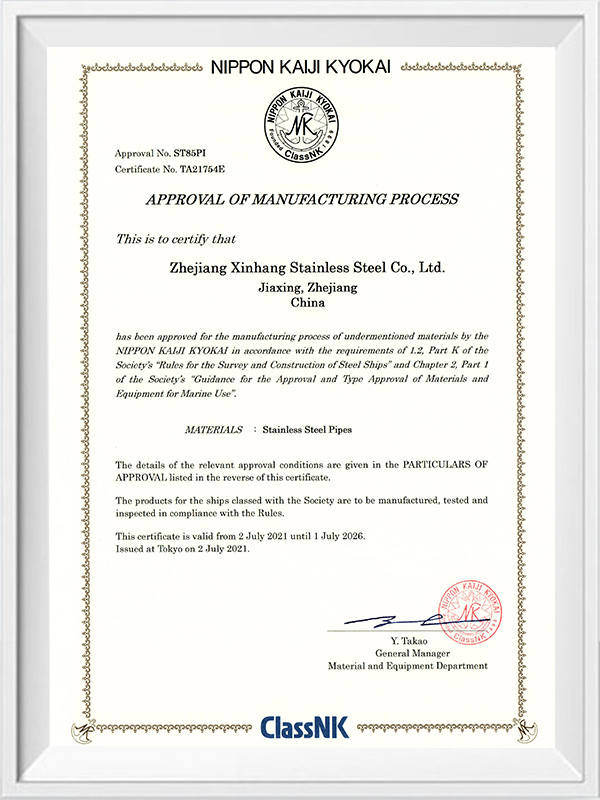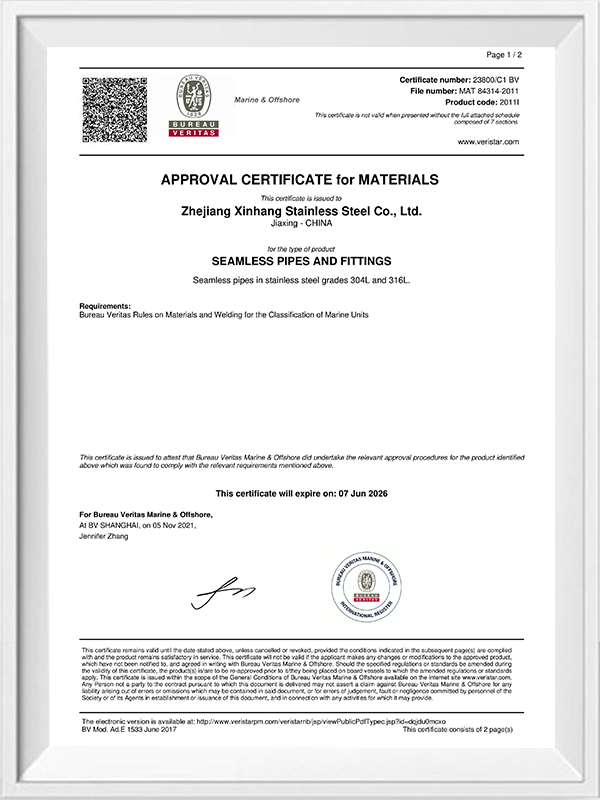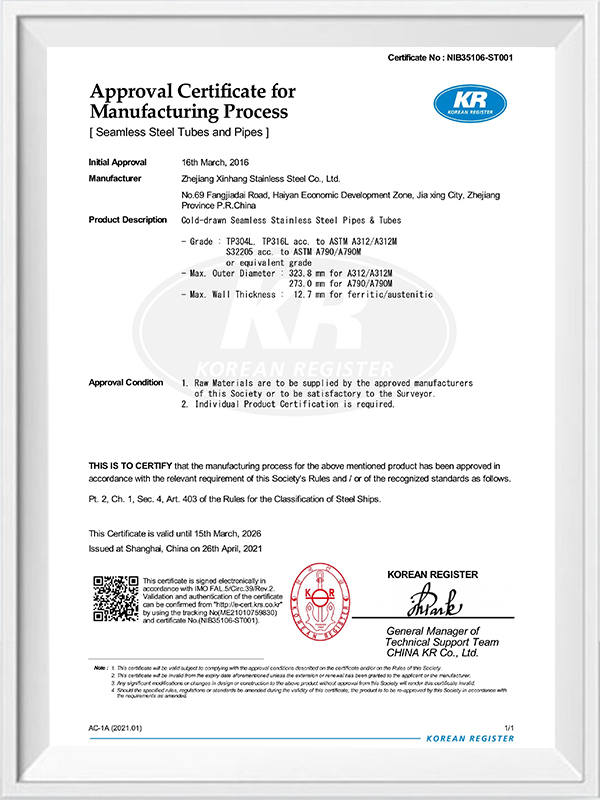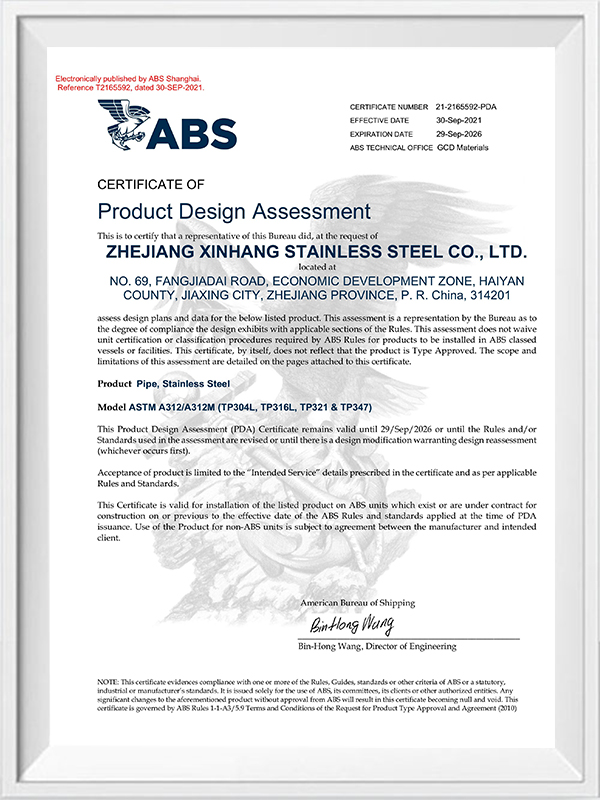

Xinhang Special Material Co., Ltd. Hangzhou Branch is China stainless steel tube/pipe for structures Manufacturers and stainless steel tube/pipe for structures Factory, founded in 2007 and moved to Longyou Economic Development Zone, Zhejiang Province, in 2022. It covers an area of 130,000 square meters, more than 30 production lines, 300 workers, 20 R&D people, 30 inspection people and an annual output of 50,000 tons.
It has passed ISO9001:2008 quality management system, PED 97/23/EC EU Pressure Equipment Directive certification, China Special Equipment Manufacturing License (Pressure Tube) TS certification, ASME certification, provincial enterprise standardization management system, ISO14000:2004 environment management system, cleaner production (green enterprise), and a series of certifications, as well as China Classification Society (CCS), American Bureau of Shipping (ABS), British Register of Shipping (LR), Deutsche Veritas (GL), Bureau Veritas Society (BV), Det Norske Veritas (DNV), and Korean Register of Shipping (KR) factory certification.
The main products include stainless steel pipes, pipe fittings, flanges, valves, etc., which are widely used in petroleum, chemical industry, nuclear industry, smelting, shipbuilding, pharmaceuticals, food, water conservancy, electric power, new energy, mechanical equipment, and other fields. The company adheres to the corporate tenet of "quality for survival, reputation for development" and wholeheartedly serves every customer to create a win-win situation.




Bottom line: how to weld stainless steel pipe without sugar and leaks For most stainless steel pipe work, the most reli...
View MoreDirect answer: what a “stainless steel pipe pressure rating” really means A stainless steel pipe does not have one univ...
View MoreIn our shop, bending stainless steel pipe is one of those operations that looks simple but punishes shortcuts. Stainless...
View MoreWhat SCH 10 stainless steel pipe specifies (and what it doesn’t) In piping specifications, “SCH” (schedule) is shorthan...
View MoreWhat are the different grades of stainless steel available for mechanical tubing?
304 Stainless Steel: This is the most common type of stainless steel tubes used in mechanical applications. It offers good corrosion resistance, weldability, and formability, making it suitable for a wide range of applications.
316 Stainless Steel: Known for its superior corrosion resistance compared to 304 stainless steel, 316 stainless steel is often used in environments where exposure to corrosive elements is a concern, such as marine or chemical processing applications.
321 Stainless Steel: This grade contains titanium, which stabilizes the material against chromium carbide precipitation during welding, making it suitable for high-temperature applications.
409 Stainless Steel: This ferritic stainless steel grade is commonly used for automotive exhaust systems and other applications where heat resistance and corrosion resistance are important.
410 Stainless Steel: With high strength and moderate corrosion resistance, 410 stainless steel is often used in applications requiring wear resistance, such as pump shafts and valve components.
Duplex Stainless Steels (e.g., 2205, 2507): These grades offer a combination of high strength and excellent corrosion resistance, making them suitable for demanding mechanical applications in aggressive environments, such as offshore oil and gas platforms.
Precipitation Hardening Stainless Steels (e.g., 17-4 PH): These grades can be heat-treated to achieve high strength and toughness, making them suitable for applications requiring high mechanical properties, such as aerospace components and shafts.
What design considerations should be taken into account when incorporating stainless steel pipes into mechanical structures?
Material Selection:Choose the appropriate grade of stainless steel based on factors such as corrosion resistance, strength, and temperature resistance.
Consider any specific requirements or standards that the material must meet for the intended application.
Dimensional Accuracy and Tolerances:
Ensure that the dimensions of the stainless steel tubes meet the required tolerances for proper fit and alignment within the mechanical structure.
Account for any potential variations in dimensions due to manufacturing processes or material properties.
Load and Stress Analysis:Conduct thorough load and stress analysis to determine the expected forces and stresses acting on the stainless steel tubes within the mechanical structure.
Design the tubing and supporting structures to withstand these loads without deformation or failure.
Structural Integrity:Design connections and joints between stainless steel tubes and other structural components to ensure adequate strength and stiffness.
Consider factors such as welding, bolting, or adhesive bonding methods for joining tubes to other components.
Corrosion Protection:Implement corrosion protection measures to mitigate the risk of corrosion in aggressive environments.
This may include selecting a corrosion-resistant grade of stainless steel, applying surface coatings or treatments, or designing drainage and ventilation systems to prevent moisture accumulation.
Fatigue and Fracture Resistance:Consider the potential for fatigue failure in stainless steel tubes subjected to cyclic loading.
Design the structure to minimize stress concentrations, incorporate smooth transitions and fillets at critical points, and avoid sharp corners or notches that could act as stress risers.
Temperature Considerations:Account for temperature variations and thermal expansion effects, particularly in applications with significant temperature fluctuations.
Provide allowances for thermal expansion and contraction to prevent distortion or excessive stress in the structure.
We'll never share your email address and you
can opt out at any time, we promise.